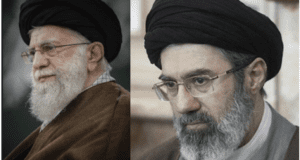African-American militants and Vietnamese communists had major storylines, and they too are treated realistically. Their political ideas and experiences as the victims of imperialist capitalism are presented with truly unprecedented sympathy and honesty. All the socialist characters demanded that they be treated as honest members working on behalf of a progressive, enlightened political system – socialism. Of course they all lose in the end, but it is amazing that they got past US censors in the first place.
“The Americans” also did a better job of discussing Soviet history than American journalists – to give just one recent example, they actually talked about the fact that the Soviets won World War II (the Western front) and that 25 million Soviets died. If you tried to give that number in a US news-debate show you’d probably be shouted down. Time and again the female spy character cites facts, achievements and principles to defend the socialist cause and is an ardent Soviet nationalist.
And that makes “The Americans” revolutionary viewing. Socialist motivations and ideology have never been even objectively presented in American television. It seems that 30 years after the implosion of the USSR, US television executives finally decided to end the decades of non-stop lies and propaganda which the idiot box had broadcast regarding the USSR, socialism, communism, anti-imperialism and their related ideologies.
Of course, being an American show, the real Americans win in the end. But for leftists the show is worth watching for the female spy, Elizabeth, and her ideological monologues. She is a rock-hard socialist revolutionary, and her many years living in the US has only given her even more reasons to fundamentally reject Western capitalist culture; thus, her critiques are relevant to American society today.
It is also, much like Mad Men did for the late 1950s and early 1960s, a “time-capsule show”. The 1980s have been been replicated with big-budget production values, so the nostalgia factor is sentimentally present as well.
I spoke to a young journalist colleague in Russia – she had never heard of “The Americans”. I was quite surprised, because the portrayal of her Soviet 1980s-era ancestors is really quite thorough and flattering, even to non-socialists. There are plenty of real-life references to Soviet culture and personalities which would make it sentimentally attractive to Russian viewer, as well.
Perhaps the best thing about the finale is that there was no absurd negative foreshadowing of the Putin era; to me, this reflects the serious nature with which the Russians and Soviets are treated with thought the series. If the Russians are waiting for a better, reasonably honest, big-budget TV series about the Soviet era…they will be waiting quite a long time.
Most Americans TV shows revolve around fame, death or sports, so I really must recommend this drama as a politically-enlightened form of escapism.
Analysing the finale: another ‘deathbed conversion’ by Hollywood
Of course the real Americans were going to win, but the question was how?
It is unfortunate that the show’s final storyline so unbelievable: After 5.9 seasons of determined, shining, staunch support for socialism, Elizabeth (the female spy) listens to a nuclear arms reduction speech from a fictitious minister of Gorbachev…and promptly decides to defy her KGB handlers in order to support the Gorbachev faction and world peace.
She thus turns on the ideals of the revolution, her KGB comrades, her life’s work and successfully keeps Gorbachev from being deposed in a coup. I found this personality-shift unconvincing, but hey: this is Hollywood.
How different would the world have been if Gorbachev – despised in Russia today – had been deposed? At least we have this TV series to raise such a question, even if if it is answered in a way which affirms the America’s mistaken pro-imperialist & anti-socialist ideology.
Paige, the Jesus-loving teenager who was savvy enough to realize something was fishy about her parents and who then willingly signed as a junior KGB-kid, is left doing something stereotypically Russian – drinking vodka. Our final image of her is slamming a shot of vodka all alone, as she has retreated to the safe house where she was schooled on Soviet history and culture.
Clearly, she represents the upcoming post-Gorbachev “lost generation” – one which falls into alcoholism, depression and bitterness towards the failures of the older generations which have gutted her future. Paige is the trained Soviet youth that will sit in waste until Putin turns the country around.
Paige could have continued to Canada and then on to the USSR with her parents, but – in one of the show’s biggest final twists – she leaves the train at the last stop before Canada, abandoning her parents. And that shows that Paige is truly an “American”: like all members of Generation X and beyond, American children are culturally instructed to hate their parents and rebel at every opportunity. Paige might have gone to the USSR she had come to admire and even work for…if only her stupid parents weren’t there too!
However, Paige – who has descended from the socialist future to bitter brat – won’t have time to be snottily depressed for long: it’s impossible for the neophyte spy to survive on her own in America, and we can be sure she will soon be waterboarded and cattle-prodded for all she knows, and likely executed like the Rosenbergs for treason. Little wonder she is drinking.
Henry: As is the case in many top TV shows these days (notably the Sopranos), young adult female characters are extremely capable, but young adult male characters are essentially clueless and drags on society. Henry continues this trend, as he was never told of his parents’ secret life nor was he smart enough to figure it out like his sister. He was, however, smart enough to get into a rich, private, capitalist boarding school, where he thrived (and also took the boring problem of his existence off the hands of the show’s writers).
The parents decide, in another twist, to not bring Henry to the USSR. He is at home in America, they decide, and thus has proved he is truly an “American”. In a final family phone call to Henry – where they do not tell him of their double life – Philip (the spy father) continues his American-style parenting of encouraging egotistical individualism (telling him “You’re great”) and non-stop work / personal achievement / consumption (telling him to “Go go go”).
Philip then immediately goes to buy three huge bags of McDonald’s for just three people, in one last effort to get dangerously obese and thus be a typical American family. They eat in the car and on the run for work, like most Americans do.
The future of Henry is pretty grim: no parents, a tough battle to prove he was unaware of his parents spying, lifelong enormous overcompensation to prove his “American-ness” and endless bitterness towards socialism. Thus the gifted, elite-schooled, “socialism ruined my life” Henry is likely to wind up a supremely useful tool of the 1%: possibly president, like the son of a Communist-deposed Hungarian aristocrat (Nicolas Sarkozy), or the CEO of the most anti-worker American company today, Uber (headed by Iranian Revolution-fleeing Dara Khosrowshahi).
Regardless, Henry is another fine catch of the American brain drain, and his talents will not be used in Russia during their upcoming years of stagnation caused by switching form their socialist-inspired model.
Philip and Stan – spies unlike us, or each other
Philip, the father-husband-spy, was always less committed as a socialist than his wife, and this provided much of the show’s domestic tension. Philip’s does not ultimately cease his spy work in the final season because he loves the US, but more because he has becomes disillusioned with spydom.
Indeed, for a trained, embedded, murdering spy with an arranged wife…Philip was always a rather happy-go-lucky sort – he cared more for family life and his travel agency than promoting socialism. One wonders at the KGB’s selection process, especially in the area of testing ideological rigor? However, as was unambiguously implied, Philip endured homosexual sex as part of his spy training, so he was clearly VERY committed at one point in his life (I would say “too committed”!).
Philip is the one who is saved – from his feelings of guilt and the anti-American evils of socialism – by religion, and thus shifts the show’s moral centre from Paige (of course, Elizabeth for socialists like myself) to himself in Season 3.
While American baby boomers undoubtedly failed in a political sense – unlike their Chinese and Iranian counterparts – a fair case can be made that they succeeded in a spiritual sense. The recently-departed journalist-novelist Tom Wolfe correctly described the 1960s and 70s in America as the “Third Great Awakening” (a third period of American religious revivalism); there is no doubt that American spiritual values changed for a huge part of their population, though the value of these changes are in the eye of the beholder.
In a very good piece of writing, Philip embodies this post-Woodstock reality as he attends seminars for the now-deduct EST movement. EST was a quasi-religious, corporate, Scientology-like, semi-cult which focused on pure individualism and personal empowerment. EST helped Philip get in touch with his feelings, forgive himself for his many murders (one even committed before he became a spy) and to find a new level of spirituality…one which led him to abandon his comrades, political ideals, homeland, and society in favor of his own personal desires. EST is clearly a “new world” type of religion.
Stan Beeman was an FBI agent working on fighting Soviet spies who moved next door to the Soviet spy couple. The unlikely friendship between Philip and Stan is another of the show’s key plot devices.
Stan is – in classic American WASP fashion – unable to emotionally connect with his wife and son, both of whom leave him. Philip invited Stan to EST, although acting class may have been a better choice, as the actor playing Stan undoubtedly set a record for number of subtle one-way upper-lip twists per on-screen minute.
Capitalist new-age spirituality – the authentic American religion – saves the day
I include Philip and Stan here together because the show’s finale clearly wanted us to view them that way – as “best friends”. Of course, the climatic scene of the entire series is when Stan inevitably finds out that his neighbors are Soviet spies – will he let them escape or arrest them?
Cornered in a garage, Philip finally breaks his cover and appeals to Stan’s sensibilities…not with a defense of socialism, but with the Nazi Nurembourg defense of “We had a job to do.” Stan, being an FBI fascist, sympathizes of course, and his anger lessens.
Philip then repudiates his entire socialist past, describing how his life has become one big sob-story and how he and his wife have been betrayed by their comrades into trying to depose peace-loving Gorbachev. Stan responds with a statement never-before uttered by an FBI or CIA agent: “I could care less who runs your country.”
But EST makes a surprising re-appearance at this time of supreme dramatic decision. Philip tells Stan: “But we’re getting in that car, and we’re driving away. (Big sigh) I wish you had stayed with me at EST – you might know what to do here.”
Stan pauses, remembers EST’s “Me Generation” new-age religion principles and is inspired to know what to do here: He does not stop them as Philip, Elizabeth and Paige slowly move to the car. The family (minus pouting Paige) makes it back to the USSR. Three cheers for EST!
Thus it is actually religion which saves “The Americans” in “The Americans”. Not a standard religion, not even a successful new-age religion like Scientology, but an ideology which is “spiritual but not religious”, and which serves no societal and only an individualist function.
Even if Stan’s brief EST training hadn’t kicked in, religion still would have saved the spy family: the finale also included a Russian Orthodox clergy member who, under the threat of being unable to climb up the church ladder, breaks his vows and gives them up to the FBI. This is in pointed contrast to the previous episode, where the spy family’s WASP pastor (who knew they were spies) does not break his vows when questioned by the FBI, giving the average American viewer a cheap thrill of perceived religious superiority.
But it is EST which ultimately saves the day, the bad socialists, Stan from being a bad friend, and the protagonists with whom we must partially sympathise and root for or else we change the channel.
As the audience rests from the emotional climax, the song that plays is “Brothers in Arms” by Dire Straits, which aims to underscore the kinship between the two male intelligence operatives.
However, this actually only reveals the true political leanings of the writers – political and historical nihilism – as it implies that Philip and Stan are essentially the same, even though they were motivated for decades by two totally different ideologies. Stan and Philip were violent enemies and definitely not brothers-in-arms…at least not until Philip was deluded by new-age, individualist spirituality.
EST, of course, is no religion. EST is no longer even taught. But EST lives on in America in Oprah, in the selfie, in America’s refusal to deal honestly with their imperialist past, in their hedonistic worship of the present, in their desire for perpetual youth, in their efforts to make “getting what you want” somehow a positive moral value, and in the idea that we must constantly improve and transform ourselves because the American system itself is perfect and thus must not be tampered with via socialist modernisations.
EST, we can see, was always present in America’s 400+ year history in one form or another. It is little wonder that it was chosen by the writers to be the supreme, modern ideology to prevail over socialism.
Of course, EST is Reagan-era bullplop.
Reagan-era bullplop – neoliberalism – is the dominant Western ideology now, and we all knew that the series’ climactic scene would not end with Elizabeth orchestrating a socialist victory but with exhortations to more neoliberalism.
Elizabeth – another leftist misled by Gorbachev
Elizabeth is played with grim emaciation by Keri Russell, an actress who had been best-known for unexpectedly cutting off her trademark long curly hair, ruining her appeal and quickly causing the end of her poplar series “Felicity”. She appears to have learned her lesson, because whenever she is not in disguise she prominently “wears her hair forward” in this series.
Being a typical male, I had no idea what “wearing hair forward” meant until an ex-girlfriend told me as we watched this show. I defended my male obtuseness and lack of style by remarking that if she had “worn her hair sideways” I would have surely noticed. Female readers will perhaps understand why, with such bad jokes, this girlfriend is now an ex. But I end this digression….
Because Elizabeth was the unrepentant socialist (at least until the Hollywood ending) there was no doubt that the writers would finish by assassinating her character as much as possible.
One of the last scenes of her involves an unsettling dream she has while flying back to the USSR. She is in bed with her ideologically-solid African-American militant lover, whom she respected and loved more than Philip; he is rubbing her belly as she says, “I don’t want a kid anyway.” (Of course, a half-Black baby would blow her cover.) Metaphorically, this is to imply that Elizabeth does not have a soul. Literally, it is to show that she was an frigid spy queen who wanted to be motherless and thus is fine leaving her children behind; children being the only sacred family tie in Western society, which cares not for extended family as in other cultures.
In American television it is fine to denigrate the older generation, but rarely is prime motherhood portrayed as anything but as American as apple pie; it’s quite a damnation, and thus primes the viewer to interpret her socialist commitment as similarly soulless and damned. She never stopped being a committed socialist, of course, just a right-wing, Gorbachevian one. Not good enough for the West, Elizabeth.
Elizabeth gets the series very final line – “We’ll get used to it” – which is a response to Philip’s “I feel strange”. This is a continuation of the last-second effort to portray Elizabeth as a fundamentally inauthentic and soulless person. The writers clearly do not want viewers to ultimately sympathise with the socialist Elizabeth, and they thus make a deathbed confession to Hollywood that they repudiate the socialist ideas they quite ably wrote for years.
The two characters say this as the two look out over a dark, polluted, factory-filled, ominous Russian city…and the series ends.
Americans love music – analysing the song choices
Music in TV show finales is always often much discussed: Badfinger’s “Baby Blue” in the TV show “Breaking Bad’ and Journey’s “Don’t Stop Believing” for the “Sopranos”.
The previously mentioned “Brothers in Arms” was an inspired choice, even if it was instrumentalized to support political and historical nihilism.
The other use of music was far less original – U2’s “With Or Without You”, which at any given moment is being played simultaneously on roughly 900 different Western radio stations. This song played as Paige walked off the train, abandoning her parents in a fit of short-sighted Gen X resentment.
More than just explaining family dynamics, the choice of that song represents the series as a whole: It serves as a sort of love letter from America to the USSR. After all, the 1980s were a much simpler time: The world was either capitalist or communist, and you picked your camp.
Today, Islamophobia has replaced communism, and it is a far less-satisfying ideological war for everybody. The US is winning the body count race by many factors of 10, but that is only barely enough to satisfy rabid Westerners – in the age of Political Correctness they cannot full-throatedly hate Muslims as they could communists. Also, they are losing in Iraq, Afghanistan, Syria and elsewhere, unlike versus the Soviets.
Subconsciously, Westerners know that it is they who have ruined the Arab Spring, proving that they aren’t committed to democracy (nor ever were). Quite consciously, the supremacy of capitalism has only brought lower wages, austerity and economic & social instability – “this is victory?” It is no wonder that many long for the good-old Reagan-era days, when neoliberalism was just sprouting its terrible tentacles, the enemies were clear, wages and purchasing power weren’t stagnant, and flying wasn’t such a hassle.
So the song represents that the US misses the USSR as an adversary – the West could not and cannot live with or without the Soviets.
Fortunately, socialism can never die.
Unfortunately, the final music accompanying the spy couple’s return to Russia is simply a maudlin, European violin.
This is as artistically and emotionally unsatisfying as the West’s alleged “victory” over socialism. However, what choice did the writers have but phony sentimentality when they fundamentally are anti-socialist and pro-imperialist status quo?
When is the Iranian version getting broadcast?
I liked this series very much because it makes me think that: if the US can make a (semi) pro-socialist TV show 30 years after the fall of the USSR, perhaps a (semi) pro-Iranian Islamic revolution show is just 30 years away!
As of now, the archetypal TV/cinematic portrayal of modern Iran is not the Oscar-nominated Argo, but Hollywood’s 1991’s propaganda piece Not Without My Daughter. In the movie an Iranian man who tries to kidnap his daughter to Iran from his wife (Sally Field). This movie set the mould for all movies about Iran as well as all movies from Iran which receive Western praise and distribution: the plot must include tremendous oppression of women. Roger Ebert, America’s greatest and most popular movie critic ever, courageously wrote, “If a movie of such a vitriolic and spiteful nature were to be made in America about any other ethnic group, it would be denounced as racist and prejudiced.” But anything goes for Iran….
Yet “The Americans” shows that Hollywood does eventually let down their propaganda guard! Of course, the Islamic Republic of Iran learned from the Soviet implosion and will not suffer the same anti-socialist fate, but maybe in 30 years there will be a similar big-budget TV show in the US?
And so I propose: “The Christians”. Tentative broadcast date: 2048
In this TV series two Iranian Christian refugees (Why are they refugees when Christians are constitutionally represented and protected in Iran, and that Prophet Mohammad repeatedly confirms and upholds the Scriptures? No matter, this is Hollywood.) are actually secret spies for the Islamic Republic of Iran.
The series is set in Chicago, the home of the only Bahai church in North America, providing further subplots and a place where the “asylum-seeking” couple can work, applying the knowledge from their Iranian background.
The male spy, Fazlollah, is eventually disillusioned with Iranian Islamic Socialism and is won over by the corrupt and merciless “Chicago Way”: alternately rendered as “get them before they get you,” or, “If he pulls a knife, you pull a gun. If he sends one of yours to the hospital, you send one of his to the morgue.” He renounces his political and religious faith, and becomes a Bahai.
Fazlollah’s wife is not pleased about this change -she wants nothing more than to come from a hard day’s work spying, kick off her shoes, and put on her burka (her ethnic heritage is Irani Afghan).
One child joins the University of Chicago and becomes a rabid neoliberal and disciple of Milton Friedman. The other willingly becomes an Iranian Islamic Socialist and works to subvert US banking sanctions by funnelling money from the Chicago Board of Trade to Iran via their Bitcoin futures contracts. Like Paige, both “abandon” their Iranian parents by cruelly moving into homes next door after each gets married around the age of 30.
Other plot lines can involve Catholic socialists in Latin America, and even Chinese socialists – the writers of “The Americans” surprisingly never found a way to include them.
The final twist is that the couple flees the US and returns to Iran, only to find that the IRI is so strong that they no longer care about a couple of sellout spies.
On second thought, maybe the US needs 60 years to produce such a show…90 tops.
Ramin Mazaheri is the chief correspondent in Paris for PressTV and has lived in France since 2009. He has been a daily newspaper reporter in the US, and has reported from Iran, Cuba, Egypt, Tunisia, South Korea and elsewhere. His work has appeared in various journals, magazines and websites, as well as on radio and television. He can be reached on Facebook.
 Ọmọ Oòduà Naija Gist | News From Nigeria | Entertainment gist Nigeria|Networking|News.. Visit for Nigeria breaking news , Nigerian Movies , Naija music , Jobs In Nigeria , Naija News , Nollywood, Gist and more
Ọmọ Oòduà Naija Gist | News From Nigeria | Entertainment gist Nigeria|Networking|News.. Visit for Nigeria breaking news , Nigerian Movies , Naija music , Jobs In Nigeria , Naija News , Nollywood, Gist and more









